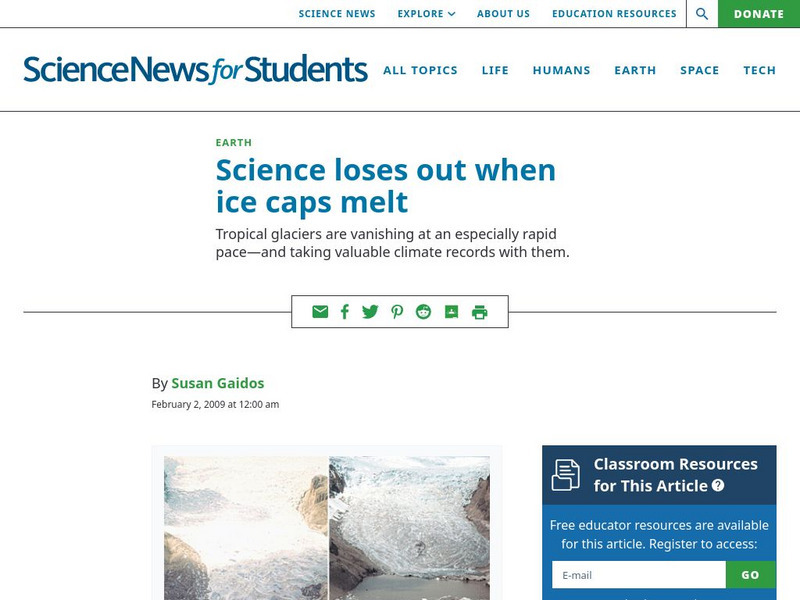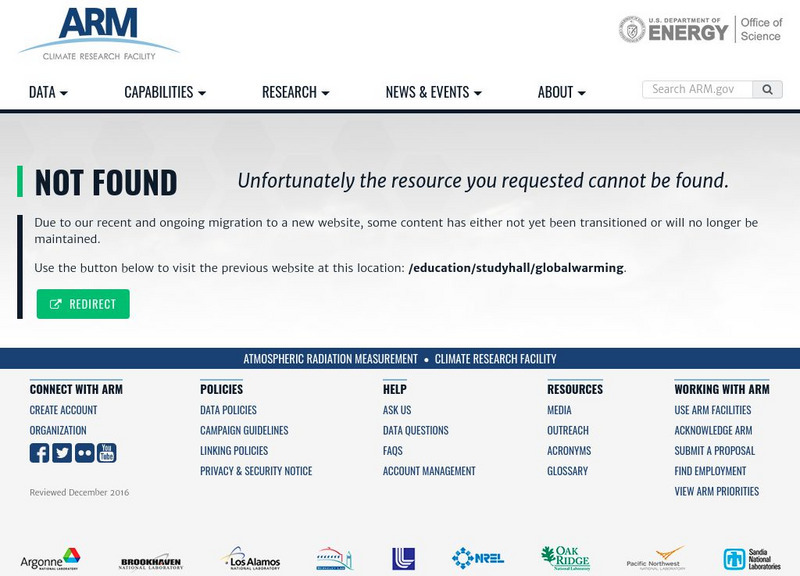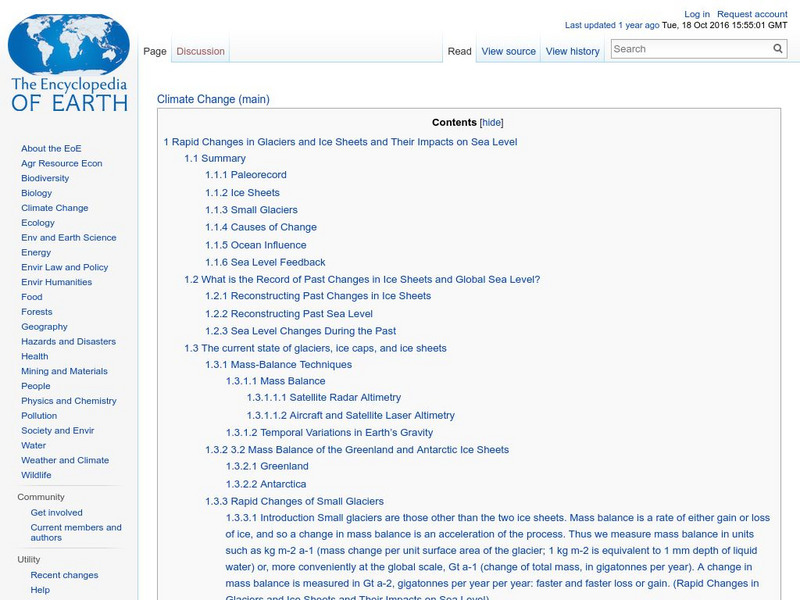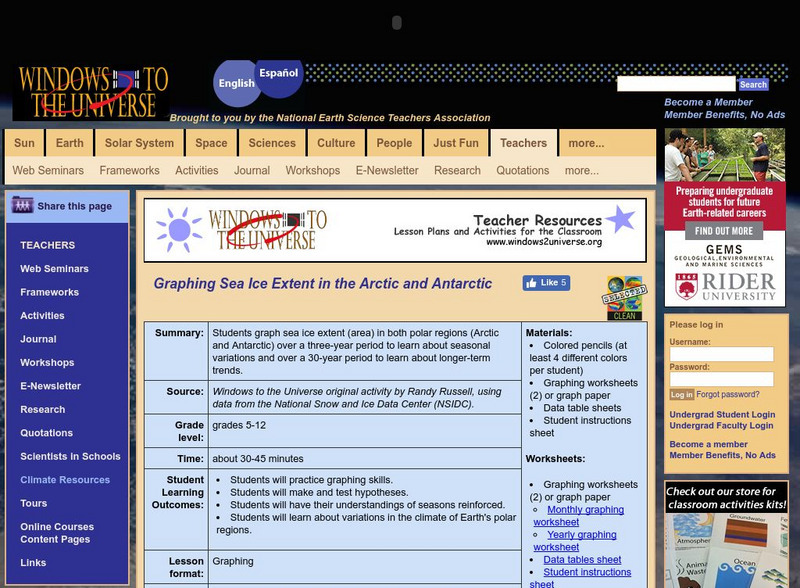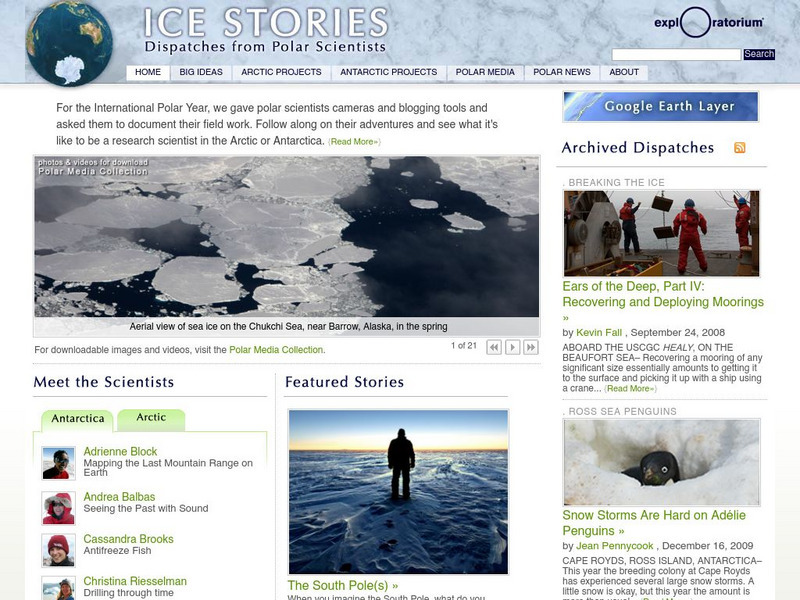Hi, what do you want to do?
Woods Hole Oceanographic Institution
Polar Discovery: The Greenland Glacier Expedition: July 7 July 24, 2008
This polar expedition took place in 2008, but you can still experience the thrill of following these scientists as they engage in research studying the changes in Greenland's ice sheet. Meet the research team and learn about the...
PBS
Pbs Learning Media: Link Between Arctic Sea Ice and Solar Radiation Absorbed
The Arctic plays an important role in regulating Earth's climate. The region reflects much of the Sun's energy and helps keep the planet cool. Data collected by NASA have revealed that sea ice in the Arctic has steadily declined over the...
PBS
Pbs Learning Media: Melting Ice
A mulit-media lesson where students explore the role that ice plays on Earth, the factors causing it to melt, and the local and global consequences of melting ice.
Society for Science and the Public
Science News for Students: Science Loses Out When Ice Caps Melt
Discusses the melting of mountain ice caps from climate change, and how this represents the loss of valuable historical data that disappears as the ice layers melt away. [February 2, 2009]
Miami University
The Little Ice Age: Was It Big Enough to Be Global?
This website discusses the devastation caused by the Little Ice Age during the 16th century. Detailed narrative provides a multitude of possible causes for the Little Ice Age.
PBS
Pbs Learning Media: Arctic Ice Reaches 2015 Minimum Extent
NASA's Scientific Visualization Studio uses data from several sources to track seasonal changes in Arctic sea ice and land cover over time. Scientists study sea ice because it influences global climate. Watch the following visualization...
PBS
Nova: Extreme Ice
Students study how scientists monitor changes in Earth's glaciers, ice caps, and ice sheets. They investigate about glacier locations, glacial movement, and impacts of climate change on glaciers depending on the depth of research.
Other
Arm Program's Education Center: Global Warming
An all purpose site with something for everyone. Learn about global warming and climate change, ask a scientist, take a quiz, or get a lesson plan!
PBS
Pbs Learning Media: Arctic Ice Extent, 1999 2016
Scientists study sea ice extent closely because it influences global climate. Follow the decline in Arctic sea ice in this animation adapted from NASA showing the yearly maximum and minimum sea ice extents from 1999 to 2016. Resources...
Encyclopedia of Earth
Encyclopedia of Earth: Rapid Changes in Glaciers and Ice Sheets
The world's glaciers and ice sheets are melting according to this extensive report. It makes recommendations on how to monitor this situation, explains what we know about the past when there was much less ice in the world, describes what...
BBC
Bbc News: An Animated Journey Through the Earth's Climate History
A narrated journey through the last 800,000 years of the Earth's climate, accompanied by images and graphs. A text-only version is also available. (Published 3 Dec. 2009)
American Geosciences Institute
American Geosciences Institute: Earth Science Week: Sea and Ice Salinity
Students investigate the effects of salinity on the formation of sea ice, and whether salt water freezes more quickly or more slowly than fresh water.
Smithsonian Institution
Smithsonian Environmental Research Center: Arctic: A Friend Acting Strangely
Discover the devastating effects of climate change on an Inuit Arctic community in northern Canada. The melting sea ice caused by global warning has started a chain reaction of many changes in the culture and survivability in the Arctic...
Curated OER
Cbc: The Great Human Odyssey: Homo Sapiens: Child of the Ice Age
A fascinating look at where humans came from. The interactive journey begins in Ethiopia over four million years ago with our ancestor, Ardipithecus ramidus. It continues at intervals along a timeline up to the present. The journey is...
PBS
Pbs Learning Media: Stories in the Ice
Take a journey back through time, using ice cores to learn about Earth's climatic history, including evidence of global warming and nuclear activity.
NASA
Nasa: Climate Time Machine
Take a trip in a "time machine" to see a series of pictures that show the how the climate of Earth has been changing. The indicators shown are: sea ice, sea level, carbon dioxide, and global temperature.
NPR: National Public Radio
Npr: Greenland: Ice on the Move
NPR offers a photographic slide show on the status of Greenland's ice glaciers as they start to melt and the consequences of the melting for the future.
Climate Literacy
Clean: March of the Polar Bears: Global Change, Sea Ice, and Wildlife Migration
Students use NASA satellite data to study temperature and snow-ice coverage in the South Beaufort Sea, Alaska. With the data, they investigate global change, sea ice changes, and polar bear migration.
Climate Literacy
Clean: Impacts of Topography on Sea Level Change
Students use web-based animations to explore the impacts of ice melt, specifically changes to sea level. They also use topographic maps to examine the relationship between topography and sea level change by mapping changing shorelines.
National Earth Science Teachers Association
Windows to the Universe: Graphing the Extent of Sea Ice in Arctic and Antarctic
Learners graph sea ice extent in both polar regions over a three-year period to learn about seasonal variations, and over a 30-year period to learn about longer-term trends.
University Corporation for Atmospheric Research
Ucar: Sea Ice and Heat: A Vicious Cycle
Melting sea ice doesn't cause sea level to rise because the ice is already in the ocean, but it does cause other changes to the planet. When sea ice melts, more sunlight is absorbed by the Earth, which causes more warming. It's a vicious...
Exploratorium
Exploratorium: Ice Stories: Dispatches From Polar Scientists
During the International Polar Year, scientists descended on the Arctic and the Antarctic in droves. While there, they documented their experiences and research work. That rich database of information, covering November 2007 to October...
NASA
Nasa Earth Observatory: Polar Paradox
In this article about global warming, learn how the warming climate could affect the polar ice caps, glaciers, sea ice, and amount of freshwater entering the polar oceans. Read how some scientists believe global warming could add to...
Other
Cape Farewell Arctic Voyage
Cape Farewell is an organization dedicated to the study of the ocean's role in regulating global temperature and its relationship to climate change and global warming. Each year a trek is made in order to study these climate changes....







